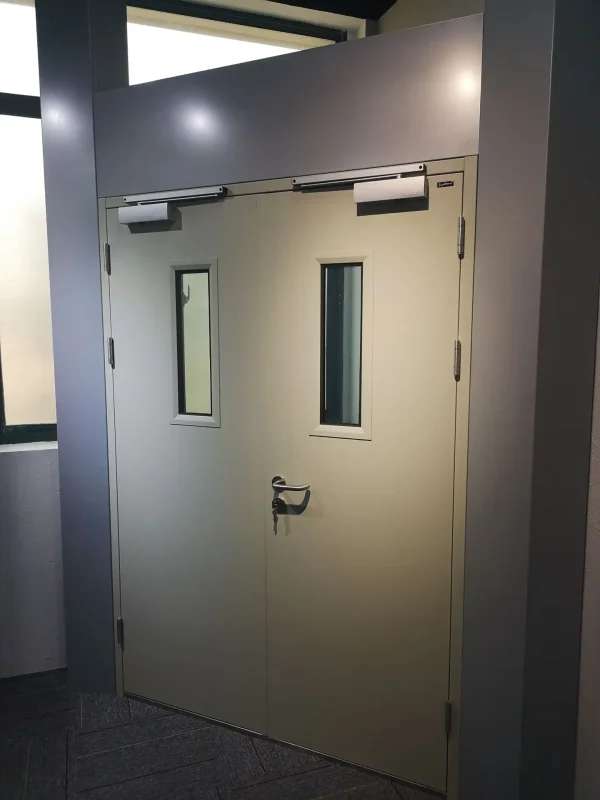Why Are Fire Doors Essential in Buildings?
As a manufacturer of fire protection building materials with over ten years of experience, we often encounter people’s doubts about fire doors. Why is there a normally closed iron door in the fire escape that affects both entry and exit, as well as lighting.In this article, we will use plain language to explain the function and precautions of fire door.Importance of Fire Doors in Buildings.

As urbanization continues to expand, an increasing number of high-rise buildings emerge, making safety a crucial concern. Among the vital safety measures in building projects, fire doors play a critical role as a necessary facility at emergency exits. Their installation ensures the protection of both lives and property in case of a fire.
1. Definition of Fire Doors-Importance of Fire Doors in Buildings
A fire door is a specialized door designed to resist heat, block smoke, and prevent the spread of fire while maintaining clear evacuation routes during a fire emergency. The primary function of a fire door is to contain the fire and allow safe evacuation. According to the national standard “Code for Fire Protection Design of Buildings”, all large public spaces and high-rise buildings are required to install fire doors, which must be regularly inspected and maintained.
2. Types of Fire Doors
Fire doors can be categorized based on the materials used and their fire resistance levels.
- Material Types:
- Steel Fire Doors: Constructed from cold-rolled or stainless steel, these doors can withstand high temperatures and are ideal for large buildings where robust fire protection is essential.
- Wooden Fire Doors: These doors are aesthetically pleasing and are often used in public spaces or residential entrances.
- Fire Resistance Levels:
- Fire doors are available in different resistance ratings, such as 30 minutes, 60 minutes, 90 minutes, and 120 minutes, based on their ability to withstand fire exposure. The selection of fire doors should be tailored to the specific building’s fire safety requirements.
3. The Role of Fire Doors
Preventing Fire Spread
Fire doors are designed to contain the fire within a specific area, preventing it from spreading to other parts of the building. By limiting the spread of the fire, these doors can significantly reduce damage and prevent larger disasters. In densely populated areas like malls, schools, or hospitals, fire doors are crucial in protecting lives and reducing fire-related losses.
Ensuring Safe Evacuation
In the event of a fire, fire doors help maintain smoke-free, heat-resistant evacuation routes. This ensures that occupants can evacuate the building safely without being exposed to excessive heat or toxic smoke, which can be deadly.
Additional Benefits
Apart from fire protection, fire doors offer insulation and soundproofing benefits in everyday use. In high-rise buildings, fire doors contribute to the building’s overall stability and safety by providing structural support and reinforcement.
4. Maintenance of Fire Doors
Regular maintenance is essential to ensure that fire doors function as intended. Key maintenance tasks include:
- Checking Seals: The door leaf should fit tightly into the frame, with uniform gaps around the edges, and there should be no damage to the door or frame.
- Inspecting Fasteners: The fixtures securing the door to the frame should be intact, and regular inspections should be conducted to ensure the door remains securely fastened.
- Repairing Damage: Damaged or malfunctioning door leaves and frames should be repaired or replaced immediately to maintain the fire door’s integrity.
Conclusion
Fire doors are indispensable in high-rise buildings and densely populated spaces. Not only do they prevent the spread of fire, but they also provide essential protection for occupants, allowing them to evacuate safely. As construction and fire safety technologies continue to evolve, the importance of fire doors in safeguarding life and property will only grow. Proper installation, regular inspections, and timely maintenance ensure that these doors remain reliable and effective in the event of a fire.

